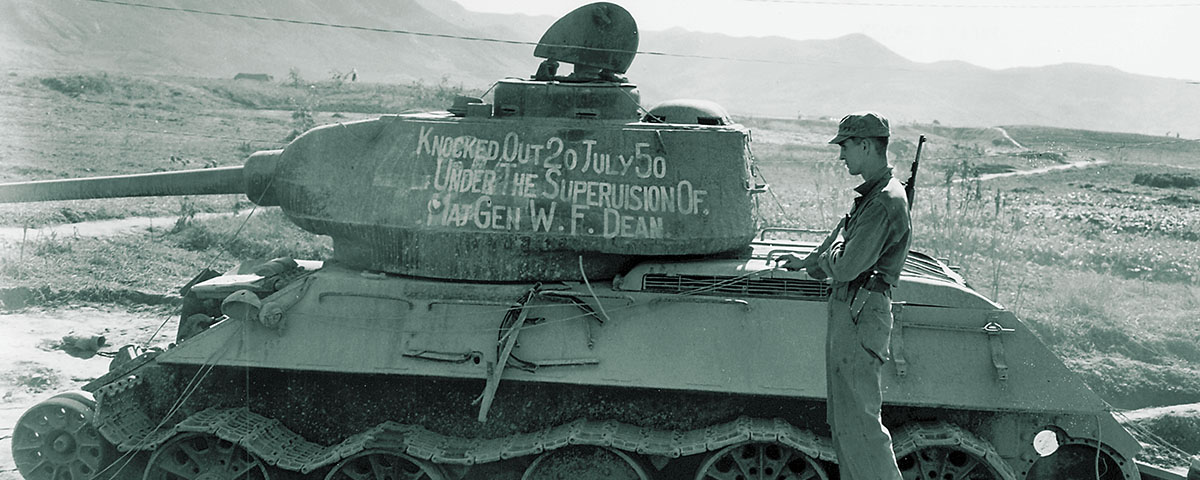As North Korean tanks rampaged through the streets of Taejon, South Korea, in mid-July 1950, a tall American officer led his unit’s tanks in the destruction of enemy armor and personally took out one tank with a hand grenade. Subsequently separated from his men, he evaded capture for 36 days before being taken prisoner. The officer was Maj. Gen. William Dean, commander of the 24th Infantry Division, and his valor in Taejon earned him the Medal of Honor. Despite his courage and leadership from the front, however, the enemy routed his broken division.
Three weeks before the Battle of Taejon the 24th ID was on occupation duty in Japan. Understrength, underequipped and undertrained, the division was ill prepared for combat. Yet it was the first American ground unit deployed in response to the North Korean attack across the 38th parallel on June 25, 1950.
Within two days of the invasion the U.N. Security Council authorized military forces under American command to repel the attack, and within five days President Harry S. Truman ordered the deployment of ground combat forces to the peninsula. Haste was paramount, as the North Korean army rolled over South Korean defenses and appeared days away from occupying the entire peninsula.
On July 1 the initial troops of the 24th ID were airlifted to Korea, and four days later they were in combat at Osan, 30 miles south of Seoul. A battalion-sized force dubbed Task Force Smith made initial contact. Outnumbered, outgunned and unprepared to face a tank-led assault, TF Smith was swept from its defensive positions. Committed piecemeal, unsupported battalion-sized elements of the 24th ID were pinned down by North Korean frontal attacks while enemy forces flanked their positions and blocked their withdrawal. Cut off, the American forces withdrew in panic, leaving behind weapons, equipment, and their dead and wounded.
The division fought four uncoordinated engagements while withdrawing 65 miles, and by July 19 it was no longer an effective combat force. Despite this, Dean was ordered to hold Taejon—the fifth largest city in South Korea and a key rail and road hub—to buy time for the arrival of additional U.S. forces from Japan.
Deploying his battered regiments north and west of the city, Dean established his command post 30 miles away, while he remained in Taejon. As the North Koreans attacked on July 20, Dean lost contact with his subordinate commanders and division headquarters. Unaware that most of his forces had abandoned their positions, and that the enemy had sealed off his routes of withdrawal, Dean was unable to rally anything larger than an anti-tank squad. He was ultimately captured and spent the remainder of the conflict as a POW.
In 17 days the North Koreans drove back the 24th ID some 100 miles. The Americans abandoned most of their equipment and suffered more than 30 percent casualties—including some 2,400 MIAs. Rough terrain, refugees and logistical constraints were the only factors that slowed the enemy advance.
On July 22 the newly arrived 1st Cavalry Division finally relieved the remnants of Task Force Smith.
Commit, then support. Massing combat power is a fundamental principle of war for a reason—the piecemeal commitment of the 24th ID’s elements ensured their destruction.
There is no command without control. Dean lost situational awareness, had no control of his division and was unable to influence the fight.
Valor is necessary, but not sufficient. Negating such individual acts of bravery and sacrifice as Dean’s were the poor training, morale and leadership within the division.

